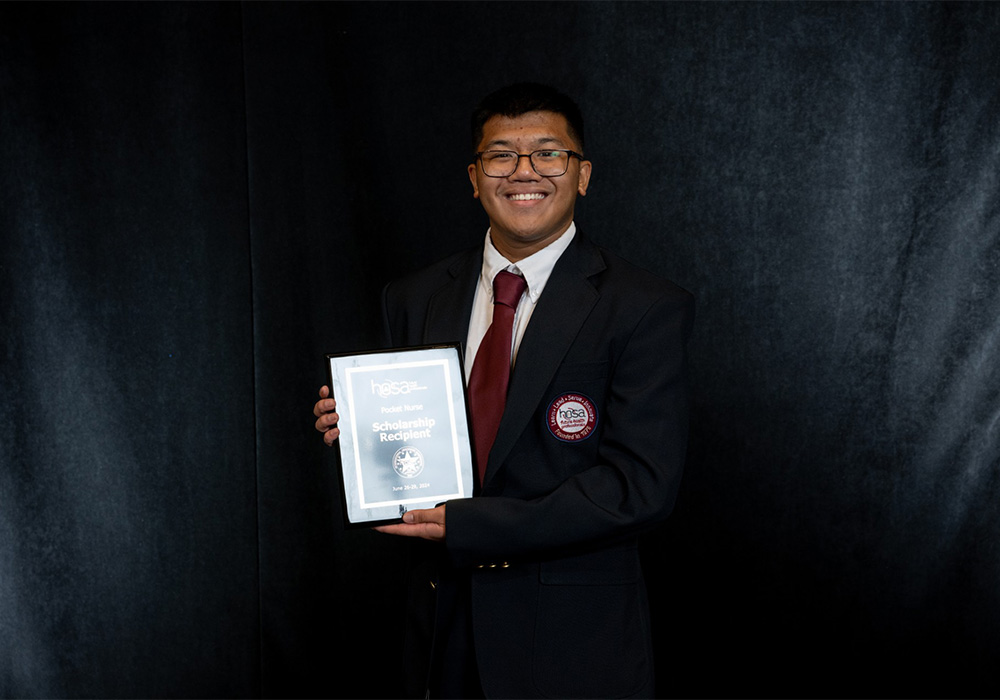Allan Cabanayan was a leader among students interested in health occupations even before he got into upper-level nursing classes at the University of South Carolina.
Growing up just down the road from USC in Hopkins, South Carolina, Cabanayan discovered his passion for nursing while attending Lower Richland High School, where he joined his school’s HOSA-Future Health Professionals chapter.
“I took health science courses my sophomore, junior and senior years of high school and through those, I affirmed my desire to be in direct patient care, and that's why I wanted to go into the nursing path of being in health care,” Cabanayan says.
After looking at several schools in South Carolina, Cabanayan knew that USC was where he wanted to end up.
“USC has a reputable nursing program. It was definitely my top choice,” Cabanayan says.
In his senior year of high school, he was elected vice president of public relations for the HOSA chapter and joined the organization’s state board as secretary — a position he continued as a freshman at Carolina.
“I was mainly helping with facilitating conferences and mentoring students,” he says. “Since it was my first year of college, a lot of people asked me about college applications, and USC in general.
After finishing up his freshman year, and his tenure with the state HOSA team, Cabanayan decided to reach even bigger goals and ran for an international position. His platform was aimed at increasing visibility and connections between the US and international professional development charters.
Now working with International HOSA, Cabanayan brought the influence of his Filipino heritage into this work, and the idea of a chapter in the Philippines was born.
Upon collaboration with other HOSA members he began working to expand the organization's reach to the archipelago.
“We really started last semester with trying to reach out to a bunch of different schools to see if they're interested in HOSA. And after getting some feedback on that and getting a little list of schools that were interested, we started getting to work on the international affiliation process with them, as well as hosting monthly meetings on Zoom for different activities,” Cabanayan says.
The chapter has affiliations with six schools in the Philippines and over 20 students are involved as active members.
“A lot of people come from the Philippines to the U.S. to work abroad and support their families back home. I just thought it kind of makes sense that there would be an international charter for a health science organization. And being able to have my culture seen a lot more and make those connections with people from the mainland Philippines … would provide me and other students good opportunities to connect with that culture,” Cabanayan says.
Last month the Philippines team hosted the flagship Manila Leadership Conference, which was a leadership workshop for students done via Zoom. Students got into groups and brainstormed public service projects to better influence the public health of their community.
As of now most of the schools affiliated with HOSA Philippines are in Metro Manila. Cabanayan says the biggest goals they are working towards are expansion and retention.
“Hopefully in the future, we're able to expand to other parts of the Philippines and really make it nationwide other than just that one part of the nation, as well as just being able to see them (Philippines members) actually come over here,” Cabanayan says. “There's a lot of logistics we're concerned about, especially on the financial side, but we're really hoping to be able to work through those and get them over here, just to be able to experience the conference.”
Currently Cabanayan works at the Student Success Center, serves on the USC First-Generation Advisory Board, College of Nursing PASS, is the president of USC’s Health Occupation Students of America chapter and continues to work with health care students in the Philippines.
